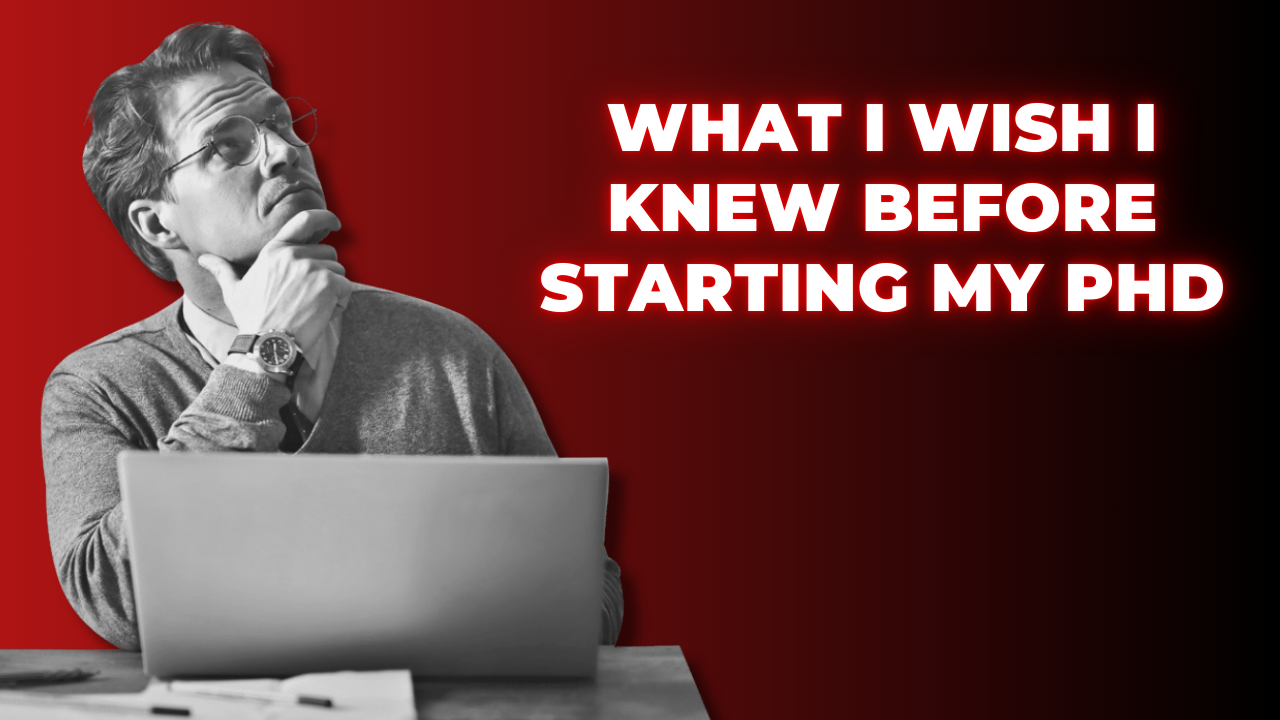21Apr
- Home
- What I Wish I Knew Before Starting My PhD
- PhD Research Updates
- What I Wish I Knew Before Starting My PhD

Embarking on a PhD journey is often seen as a noble, intellectually stimulating pursuit. It’s the highest academic qualification one can achieve, promising opportunities in research, academia, and specialized industries. However, while the title of “Doctor” may sound glamorous, the journey to get there is anything but easy. Many students dive into a PhD without fully understanding what it entails. Before starting my PhD, I had no idea how demanding and isolating it could be. If you’re considering this path, or you’ve just started, you’re probably searching for advice on how to survive—and thrive—during your PhD. In this post, I’ll share the most valuable insights I wish someone had told me before starting my PhD. These are based on personal experience, as well as lessons from fellow scholars, and they’re especially relevant if you want to set yourself up for long-term success.

One of the biggest misconceptions I had was that a PhD is just like a master’s program—but longer. In reality, a PhD is a completely different experience. While your master’s may have involved structured coursework and manageable research projects, a PhD is primarily independent research. You’re expected to contribute something new to your field, not just apply existing knowledge.
That level of innovation takes time, creativity, and perseverance. You’ll have to think like a scientist, not a student.
When choosing a PhD program, many students focus solely on the university ranking or the department’s reputation. But the most critical factor is your supervisor. This person will be your mentor, advisor, critic, and sometimes even your emotional support.
A good supervisor guides you, supports your career goals, and provides regular feedback. A bad one can lead to confusion, burnout, and delayed graduation. Before committing, talk to current or former students, and gauge the supervisor’s mentorship style.
At the beginning, you’ll be brimming with enthusiasm. But during your PhD, motivation levels will drop—sometimes drastically. Research is full of dead-ends, rejected papers, and unexpected results. There will be days when you question your intelligence, your project, and even your life choices.
What matters is how you respond. Build a support system, practice self-care, and create a structured routine to keep moving forward.
Unlike undergraduate or master’s programs, there are fewer deadlines in a PhD. This means you must become your own manager. Without strong time management, it’s easy to fall into a cycle of procrastination and guilt.
Use tools like time-blocking, Gantt charts, or the Pomodoro technique to break down your work. Set weekly goals and review them regularly. Remember, consistent progress is better than last-minute sprints.
When you start, you might think you need to stick to your original research proposal no matter what. The truth is, many students pivot or refine their topic as they go. Research is unpredictable. You might discover new questions, run into dead ends, or find that your interests shift.
Being flexible and willing to adapt is a strength—not a weakness.
Even the most brilliant PhD students sometimes feel like they don’t belong. You might think, “Everyone else is smarter than me,” or “I’m not cut out for this.” This is called impostor syndrome, and it’s incredibly common in academia.
Combat it by acknowledging your achievements, talking to peers, and seeking feedback from your supervisor. You’re not alone, and you do deserve to be here.
Your PhD is not just about producing a thesis—it’s also about joining a community of scholars. Attend conferences, publish papers, and connect with others in your field. These relationships can open doors to job opportunities, postdocs, and collaborative projects.
Plus, talking to others often helps refine your ideas and keeps you motivated.
Many students assume the end goal of a PhD is a faculty position. In reality, most PhD graduates don’t end up as professors. Industry, government, policy, consulting, and data science are just a few of the many paths available.
Start exploring your career options early. Do internships, attend career fairs, or take part in professional development workshops.
Academic publishing is slow and sometimes painful. A single paper can take months—or even years—to get published. Peer reviewers might be harsh or reject your work outright. Learning to accept criticism and revise your work is part of the journey.
Start small: aim for conferences, workshops, and then journals. Each submission helps sharpen your writing and research skills.
Your thesis may be the final goal, but the road to it is full of small victories: finishing a chapter, presenting at a seminar, debugging a stubborn piece of code. Celebrating these moments keeps you motivated.
Track your progress and reward yourself along the way. You’re achieving something extraordinary.
Despite the challenges, I would still choose to do a PhD—because of the personal growth, intellectual freedom, and sense of accomplishment it brings. But before starting my PhD, I wish I had known how important it is to build a support system and set realistic expectations. I’d go into it with eyes wide open, better prepared for the ups and downs. If you’re about to start your PhD, remember this: it’s a marathon, not a sprint. Before starting my PhD, I underestimated how much mental resilience and time management it would require. Be patient, stay curious, and don’t hesitate to ask for help.
Kenfra Research understands the challenges faced by PhD scholars and offers tailored solutions to support your academic goals. From topic selection to advanced plagiarism checking.
The statement suggests that there are plans to introduce scholarships for MPhil and PhD students who wish to pursue their... read more
WhatsApp us
Leave a Reply